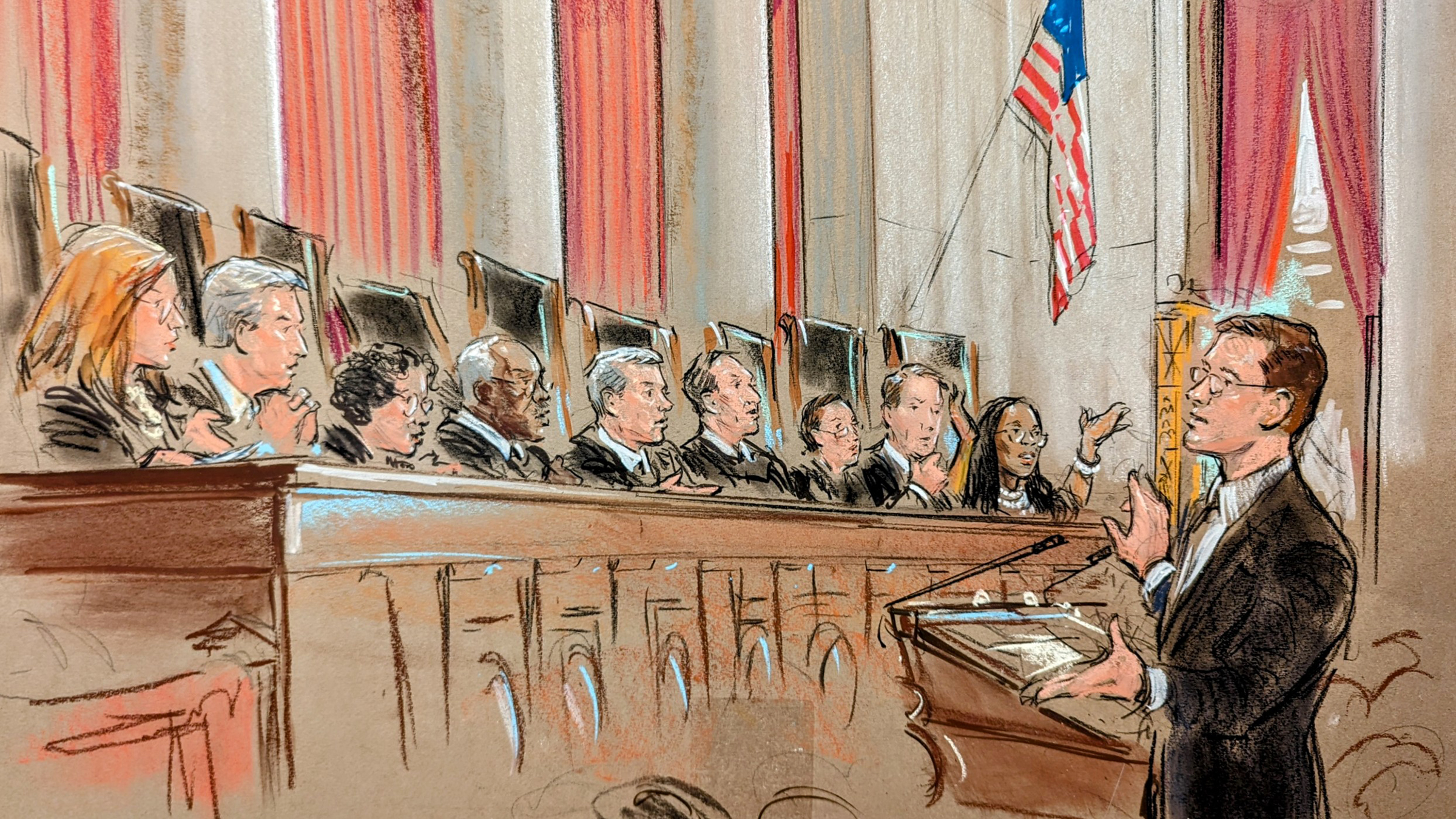We've wrapped up our live coverage for the day. You can relive today's Supreme Court proceedings as they happened by scrolling through the posts below.
Supreme Court hears arguments on Trump immunity case
By CNN's John Fritze, Tierney Sneed, Hannah Rabinowitz and Holmes Lybrand
These are the key takeaways from the Supreme Court arguments on Trump’s absolute immunity claims
From CNN's John Fritze, Tierney Sneed and Marshall Cohen

The Supreme Court appeared ready to reject former President Donald Trump’s claims of sweeping immunity and the broad protections he has sought to shut down his federal election subversion case, but also reluctant to give special counsel Jack Smith carte blanche to pursue those charges.
After nearly three hours of oral arguments, several of the justices seemed willing to embrace a result that could jeopardize the ability to hold a trial before the November election.
Much of the hearing focused on whether there should be a distinction between official acts by Trump pursuant to his presidential duties and his private conduct.
Here are key takeaways from today's oral arguments:
- Supreme Court seems unlikely to fully resolve the immunity question: As the justices wrestled with the nuances of the case and a series of complicated hypotheticals, it seemed increasingly unlikely the court would offer a clear answer on whether Trump may be prosecuted for his effort to overturn the 2020 election. The upshot is that the Supreme Court appeared likely to leave much of that work to lower courts, proceedings that could take months and further delay a trial that had originally been set for March 4. That outcome would play into Trump’s strategy of delay and jeopardize a trial before the election.
- Trump attorney concedes some acts may be "private" and not official: In a notable series of concessions, Trump’s attorney D. John Sauer acknowledged that some of the alleged conduct supporting the criminal charges against the former president were private. The admission shows how much ground Sauer gave up during the hearing, after Trump had made more sweeping claims in his legal briefs earlier this year, asserting that the entire prosecution should be thrown out because the actions in question were part of his official duties as president.
Continue reading more takeaways from the arguments.
Justices could give Trump a strategic win if they punt the case back to lower courts, legal correspondent says
From CNN's Maureen Chowdhury
While it appears the majority of Supreme Court justices are not willing to dismiss special counsel Jack Smith's case outright, they may punt it back to lower courts, which would delay a trial and hand a strategic win to former President Donald Trump, CNN chief legal correspondent Paula Reid said.
"It's pretty clear from what we heard that the majority of justices are not willing to just toss out the special counsel's case," Reid said.
But, she continued, Chief Justice John Roberts "clearly believes that the lower courts did not do enough to suss out exactly what is an official act versus a private act. So what they're setting up here is likely the justices are going to come up with some sort of test, and then send it back down to the lower courts for more litigation."
There is a possibility the case could be brought back to the justices a year from now, "after more litigation at the lower-court level, or if Trump is reelected, he can make this case go away. So, even if he's not likely poised for a legal win at the high court, strategically, it sounded like this is going to be a win for him," Reid said.
Remember: The issue of determining whether Trump's actions were "private" or "official" is central to the former president's claim that his efforts to overturn the 2020 election were part of his official duties as president — and therefore subject to immunity from prosecution.
Arguments in Trump’s historic Supreme Court immunity dispute are over
From CNN's John Fritze
With Chief Justice John Roberts announcing that the “case is submitted,” the court has finished hearing arguments in Trump’s immunity case.
And that raises an important question that is largely unanswerable: Just how much time will the high court take to hand down its opinion? Usually, a major case argued in April wouldn’t be decided until the end of June.
But in the Trump immunity appeal, the court is already facing criticism for the weeks it took to decide whether to take the case. There is concern, particularly on the left, that the slow pace benefited Trump’s broader legal strategy to delay a trial until after his election.
On the other hand, the justices operate on their own schedule, and the court was designed to resist external pressures on their work.
Barrett sketches out how case could go to trial this year
From CNN's Katelyn Polantz
In a lengthy and crucial exchange between Justice Amy Coney Barrett and the Justice Department's Michael Dreeben, the Supreme Court heard how Trump's case could see a path to trial this year.
Barrett sketched out that the case could go to trial, and how, if the Supreme Court sends it back to the trial level, it could be heard by a jury without further appeals court involvement.
That would mean no further delays in Donald Trump's case before a trial, once the Supreme Court rules.
"The special counsel has expressed some concern for speed," Barrett said.
She asked Dreeben if the trial-level could sort out what's official or private acts of the presidency in this key, or is there "another option for the special counsel just to proceed on the private conduct?"
Dreeben told her the indictment is substantially about private conduct. He says the special counsel's office would like to present a full picture of the allegations to the jury.
But in Trump's legal world, leaving determinations about his allegations in the case could be disastrous before the election, according to polls as well as the jury pool makeup in Washington, DC.
Justice Jackson: In "ordinary" case, trial would proceed even if defendant has some immunity protection
From CNN's Hannah Rabinowitz
Justice Ketanji Brown Jackson says in an “ordinary” case, a trial would move forward even if a criminal defendant had immunity for certain actions.
“There is sufficient allegations in the indictment, in the government’s view, that fall into the 'private acts' bucket that the case should be allowed to proceed,” Jackson said.
“Because in an ordinary case, it wouldn’t be stopped just because some of the acts are allegedly immunized. Even if people agree that some are immunized. If there are other acts that aren’t, the case would go forward.”
“That is right,” Michael Dreeben, the special counsel’s attorney, said.
Dreeben has repeatedly said many of Trump’s actions around the 2020 election were part of his presidential duties, and therefore aren’t protected by immunity – even if the high court said the former president had some level of protection.
Special counsel attorney tells Barrett that SCOTUS ruling could impact state Trump prosecutions
From CNN's Holmes Lybrand
The attorney for special counsel Jack Smith suggested that if the Supreme Court found that presidential immunity was implicit, it could also protect the president from state prosecution.
“If the president has some kind of immunity that’s implicit in Article Two (of the Constitution) then that immunity would protect him from state prosecution as well?” Justice Amy Coney Barrett asked.
“Of course,” attorney Michael Dreeben said.
Trump has been charged in a widespread conspiracy case in Fulton County, Georgia, for his actions to subvert the 2020 election results.
Meanwhile, judge upholds jury verdict against Trump in E. Jean Carroll defamation case
From CNN's Kara Scannell in New York
In New York on Thursday, a federal judge upheld the E. Jean Carroll defamation verdict and $83 million damages award, denying Donald Trump’s motion for a new trial.
Judge Lewis Kaplan, in a written opinion Thursday, said Trump’s legal arguments are without merit. The judge also found that the punitive damages the jury awarded Trump “passes constitutional muster.”
Trump is also separately appealing the verdict.
Gorsuch and Kavanaugh highlight the historical importance of immunity case
From CNN's Holmes Lybrand
When discussing the issue of determining motivation in the case, Justice Neil Gorsuch highlighted the historical importance of the Supreme Court’s ruling on the matter of presidential immunity.
“I’m not concerned about this case, but I am concerned about future uses of the criminal law to target political opponents based on accusations about their motives,” Gorsuch said.
The justice added: “We’re writing a rule for the ages.”
Justice Brett Kavanaugh echoed that sentiment, noting that the case has future implications for the presidency and the country as a whole.





